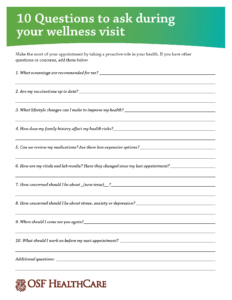
Talking to your primary care provider
The key to a good relationship is communication. That’s how the town doctors of days past knew how to treat their patients. Even without modern medicine, they could help patients because they lived in tight-knit communities and knew them like family.
While our worlds have expanded, you still need to maintain a close, trusted relationship with your primary care provider (PCP), most often a physician, nurse practitioner or physician assistant. Talking and asking questions will keep you healthier and make their job easier – a win, win.
In addition to chronic disease management, the focus of your PCP is to keep you healthy so you can pursue your passions. That is why it is essential to have a PCP you trust – someone you feel comfortable discussing your health issues with and not a check-the-box provider.
“Some people treat their PCP like they treat their car insurance. They look for the cheapest and easiest provider and then ignore them until they have a problem,” said Dr. Mark Meeker, an internal medicine physician with OSF Medical Group. “But that is not how you should approach something as serious as your health. You need to find a physician, nurse practitioner, or physician assistant with whom you can have easy, free-flowing communication.”
The challenge of diagnosing
It can be easy to fall into the trap of thinking that providers know everything about the human body and the exact cause of every problem, but it’s not that easy. Our bodies are complicated, and everybody reacts uniquely to injuries, diseases and infections. While the framework of care can be standardized based on best medical evidence, specific evaluation and treatment decisions still need to be personalized.
“Trying to figure out someone’s problem based on a few symptoms can take a bit of detective work. A lot of the time, you may not have symptoms but a gut feeling. You just know something is wrong. That’s why it’s important to communicate,” Dr. Meeker said. “I want to know how my patients experience life to help them avoid or find the roots of their problems. Lifestyle choices, genetics and environments have a big influence over our health. Unfortunately, we don’t have a superpower that tells us what’s going on inside your body.”
A short list of some of the questions your PCP would be interested in:
- When did or do the symptoms start? E.g., before bed, after eating, last week….
- Do you use, or are you around chemicals or other environmental factors?
- Are you taking any over-the-counter medications or supplements?
- Have you been exposed to anyone who is sick?
- Do you use alcohol, tobacco, narcotics or other substances?
- Has anything out of the ordinary happened?
- Have you traveled recently?
There are so many variables that can affect our health that the list could go on and on. The essential takeaway – have honest, open conversations with your PCP.
Medications
While medications make our lives better, there is no magic pill. Medications are only tools and should be used with caution. We need to maintain respect for when and how we use them, especially in combination with other medicines.
“Make sure you understand your medications. Your PCP should answer any questions you have about the medications they prescribe you.” Dr. Meeker said. “It’s also extremely important that you tell your PCP about any medications, supplements and even narcotics you are taking. Making mistakes, mixing or abusing medications can have serious consequences. But taken appropriately, they have significant benefits.”
What to bring to your appointments
Be prepared and have an open mind when you arrive for your appointments. Dr. Meeker encourages you to ask questions about sensitive subjects. Don’t be afraid or embarrassed. The information may be vital to an accurate diagnosis and treatment plan. Following a prepared lists will ensure you remember everything and make the most use of your limited time.
- A list of your medicines and any questions or concerns regarding them
- A list of other health care providers you see
- Information about your family history
- A list of questions you have and anything you want to talk about
- Copies of relevant records and tests from other hospitals or health care providers
Ultimately, we are responsible for our health. Asking and answering questions is the best way to identify problems and avoid unnecessary health issues. It’s essential to maintain a relationship with your primary care provider to stay healthy for life.
